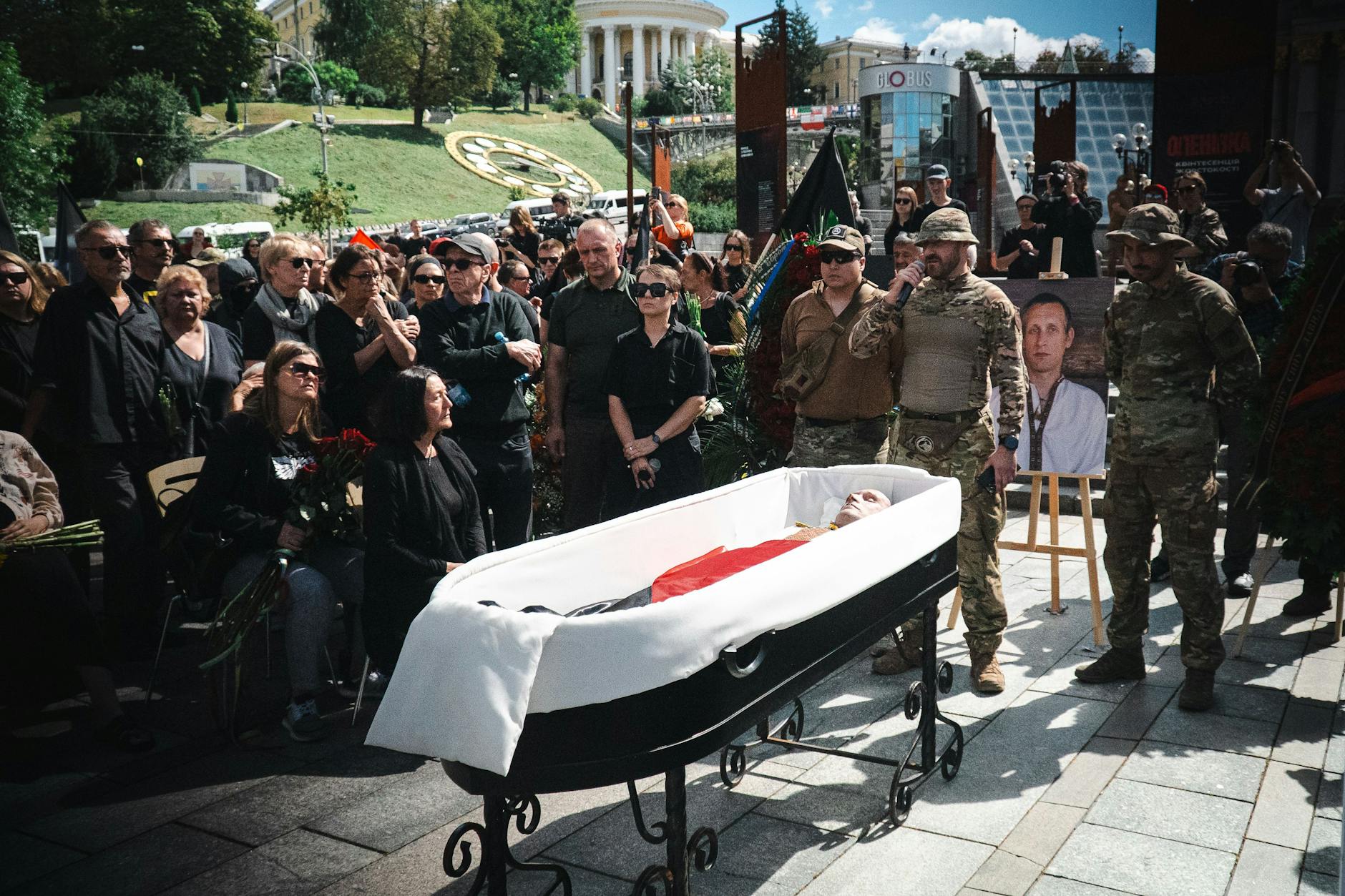He showed the dark history of the Ukrainian army and has now fallen: Farewell to David Chichkan

It's eleven o'clock in the morning on the Maidan in Kyiv. More and more people are flocking to the square; they're there to say goodbye to David Chichkan, a well-known Ukrainian artist who combined his art with his political stance. David Chichkan was an anarchist. A year ago, he volunteered for the front lines. He served with a mortar. These high-angle grenade-firing guns are used as close to the battle line as possible due to their limited range. On August 10, David Chichkan died in the Zaporizhzhia region, after being seriously wounded the day before. He was 39 years old.
Most people here on the Maidan are wearing black, the color of mourning, the color of anarchists. They hold flowers in their hands: red roses, sunflowers, which have become symbols of Ukrainian identity and solidarity. Some hold the black flag of anarchy, the black and red flag of the anarcho-syndicalists, the black and green of the eco-anarchists, or the black and purple of anarcho-feminism. A few Ukrainian flags can also be seen. Maksym Nakonechnyi arrived with a rainbow flag. He knew David Chichkan and says that he would have liked all the flags representing his ideas to be present at his funeral.
A black car drives into the square, the coffin is carried out by soldiers in uniform, placed in the square, and opened. Many now kneel.
David Chichkan was an artist hated by right-wing radicals in Ukraine. Diana Berg and her husband Aleksandr Sosnowskyj, both from Mariupol, knew him personally and experienced this hatred. They recount that in 2017, an exhibition of his works at a cultural center in Lviv was attacked; his paintings were destroyed, and slogans were sprayed on the walls. And that wasn't the only time. Last year, his exhibition at the National Art Museum in Odessa was canceled after anonymous threats. The exhibition was dedicated to the anarchists and anti-authoritarian socialists in the Ukrainian army.
Glory to the Hero of Ukraine David ChichkanChichkan also addressed the dark history of Ukrainian militias who perpetrated numerous pogroms against Jews during the Russian Civil War between 1918 and 1920, thus tarnishing the national heroic myth. Hence the hatred.
The numerous speakers at the memorial service this Monday paint a picture of a man who not only spoke his words, but also put his principles into action. The commander of his unit said he never hid behind his comrades. A chant repeatedly echoes across the square: "Glory to the Hero of Ukraine, David Chichkan."
Like almost every memorial service for a fallen soldier, this one is a powerful demonstration of national solidarity and perseverance. But this is about more. Next to Maksym Nakonechnyi with the rainbow flag stands a soldier holding the flag of LGBT soldiers in the Ukrainian army. He says attitudes toward them are divided. In some units, they are fully integrated, while others are commanded by homophobic commanders. "We are not beaten, but we are discriminated against."

They founded the association partly so they could protest loudly every time. "I mean, we're dying for this country; they have to change the laws." While homosexuality has been legal in Ukraine since 1991, same-sex partnerships are not. If a soldier dies on the front lines, their partner is left without any state support. David Chichkan also stood up for them; he was full of dignity. "He could have sat down in an army office, but he deliberately joined the infantry."
A loaf of bread lies on David Chichkan's coffinHe is also present as an artist on the Maidan that day. Ten people are holding his paintings. Some depict men and women in uniform; one is titled "Anti-authoritarian Defenders of Ukraine." Sashko, a filmmaker from Mariupol, is carrying one of these paintings. He gets straight to the point: "I'm allergic to all these Western intellectuals who want to tell us that anarchists aren't allowed to fight. What are we supposed to do, organize poetry readings?" David Chichkan, he says, wanted to defend the people of his country who were being wronged by the front lines. He also saw this fight as a fight against fascism.
David Chichkan's young widow, Anna, stands by the open coffin. In a Facebook post after his death, she expressed the hope that those who had harassed and insulted her husband, disrupted his exhibitions, and threatened him, would now at least feel remorse. "He died at the front after spending a year in hell, while so-called patriots sitting at home on the sofa criticized him as a leftist."
Then the Ukrainian national anthem is played, and the coffin is closed. A loaf of bread lies on the lid on an embroidered cloth, a Ukrainian custom.
Berliner-zeitung

